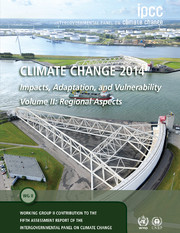 Climate Change 2014 – Impacts, Adaptation and Vulnerability: Part B: Regional Aspects
Climate Change 2014 – Impacts, Adaptation and Vulnerability: Part B: Regional Aspects Chapter 30 - The Ocean
from Chapters 21-30
Published online by Cambridge University Press: 05 January 2015
Summary
30.1. Introduction
The Ocean exerts a profound influence as part of the Earth, interacting with its atmosphere, cryosphere, land, and biosphere to produce planetary conditions. It also directly influences human welfare through the provision and transport of food and resources, as well as by providing cultural and economic benefits. The Ocean also contributes to human welfare indirectly through the regulation of atmospheric gas content and the distribution of heat and water across the planet. This chapter examines the extent to which regional changes to the Ocean can be accurately detected and attributed to anthropogenic climate change and ocean acidification, building on the conclusions of Chapter 6, which focuses on the marine physiological and ecological responses to climate change and ocean acidification. Detailed assessment of the role of recent physical and chemical changes within the Ocean to anthropogenic climate change is provided in WGI AR5 (particularly Chapters 2, 3, 13, and 14). In this chapter, impacts, risks, and vulnerabilities associated with climate change and ocean acidification are assessed for seven ocean sub-regions, and the expected consequences and adaptation options for key ocean-based sectors are discussed. Polar oceans (defined by the presence of sea ice in the north and by the Polar Front in the south) are considered in Chapter 28.
Given that climate change affects coastal and low-lying sub-regions of multiple nations, detailed discussion of potential risks and consequences for these regions occurs in the relevant chapters of this report (e.g., Chapters 5 and 29, as well as other regional sections).
30.1.1. Major Sub-regions within the Ocean
The Ocean represents a vast region that stretches from the high tide mark to the deepest oceanic trench (11,030 m) and occupies 71% of the Earth's surface. The total volume of the Ocean is approximately 1.3 billion km3, with approximately 72% of this volume being below 1000 m (Deep Sea (DS); Section 30.5.7). There are considerable challenges in assessing the regional impacts of climate change on the Ocean.
- Type
- Chapter
- Information
- Climate Change 2014 – Impacts, Adaptation and Vulnerability: Part B: Regional AspectsWorking Group II Contribution to the IPCC Fifth Assessment Report, pp. 1655 - 1732Publisher: Cambridge University PressPrint publication year: 2014
- 18
- Cited by
